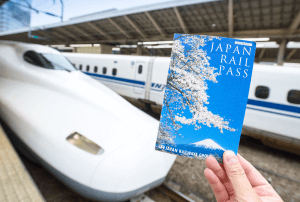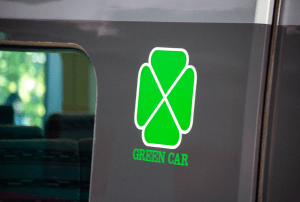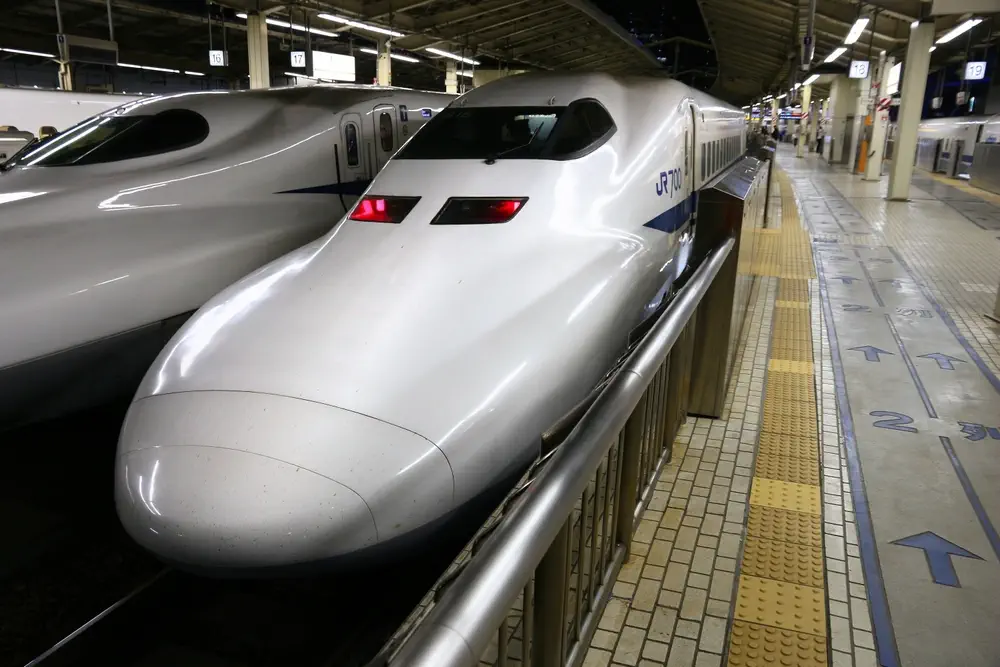The Hikari Shinkansen is one of the main bullet trains that runs on the Tokaido and Sanyo Shinkansen line, connecting Tokyo with cities like Kyoto, Osaka, and Okayama.
This train service offers a perfect balance between speed, comfort, and accessibility, especially for travelers using the Japan Rail Pass.
While not as fast as the Nozomi, the Hikari (meaning ‘light’) is the second-fastest option on this route and makes fewer stops than the slower Kodama. The bullet train operates at 285 km/h (177 mph) along the Tokaido Shinkansen and at 300 km/h (190 mph) on the Sanyo Shinkansen.
The Hikari Shinkansen is an ideal option for tourists. It delivers a seamless and scenic ride through some of Japan’s most culturally rich and historically significant destinations.
Here we take you through everything you need to know about the Hikari Shinkansen, including the stops, timetable, and tickets.
Table of Contents
Hikari Shinkansen route and stops
The Hikari trains operate on the Tokaido Shinkansen line, which stretches from Tokyo to Shin-Osaka. Some services also continue on the Sanyo Shinkansen line toward Okayama or Hiroshima.
Key stops on the Hikari Shinkansen include:
- Tokyo
- Shinagawa
- Shin-Yokohama
- Nagoya
- Kyoto
- Shin-Osaka
- Okayama
- Fukuyama
- Hiroshima
Depending on the train, it may also stop at:
- Shizuoka
- Hamamatsu
- Himeji
- Maibara
- Kobe (Shin-Kobe)
- Toyohashi
- Mikawa-Anjo
- Gifu-Hashima
Unlike the Nozomi, which skips many intermediate stations, the Hikari offers a well-balanced schedule for both speed and accessibility.
Below is a full list of all the stations that this train stops at, including possible connections.
| Stop | Major connections available |
| Tokyo | JR Yamanote Line, Chuo Line, Keihin-Tohoku Line, Narita Express, Tokyo Metro Marunouchi Line |
| Shinagawa | JR Yamanote Line, Keihin-Tohoku Line, Yokosuka Line, Toei Asakusa Line |
| Shin-Yokohama | Yokohama Line (JR), Tokyu Shin-Yokohama Line, Sotetsu Line |
| Odawara (some trains) | Odakyu Line, JR Tokaido Line, Hakone Tozan Railway |
| Atami (some trains) | JR Ito Line, JR Tokaido Line |
| Shizuoka | JR Tokaido Line, local buses |
| Hamamatsu | JR Tokaido Line, Enshu Railway Line |
| Toyohashi (some trains) | JR Tokaido Line, Meitetsu Nagoya Line |
| Mikawa-Anjo (some trains) | JR Tokaido Line |
| Nagoya | JR Chuo Line, Kansai Line, Tokaido Line, Meitetsu Lines, Kintetsu Lines, Subway Higashiyama & Sakuradori Lines |
| Gifu-Hashima (some trains) | Meitetsu Hashima Line |
| Maibara | JR Hokuriku Main Line, JR Biwako Line, Shirasagi Limited Express |
| Kyoto | JR Nara Line, Sagano Line, Subway Karasuma Line, Keihan Line (via walk) |
| Shin-Osaka | JR Kyoto Line, Osaka Loop Line, Subway Midosuji Line, Sanyo Shinkansen |
Note: Not all Hikari trains stop at every station listed above. Some operate as semi-fast services and skip less busy stops like Mikawa-Anjo or Gifu-Hashima. Always check your train’s specific schedule.
Hikari Shinkansen timetable
Hikari Shinkansen trains run approximately every 30 minutes in each direction throughout the day. The first trains generally depart:
- From Tokyo around 6:00 AM
- From Shin-Osaka around 6:00 AM
Last departures are typically around:
- 9:30 PM from Tokyo
- 9:00 PM from Shin-Osaka
The journey from Tokyo to Kyoto takes about 2 hours and 40 minutes.
From Tokyo to Osaka it takes approximately 3 hours, depending on the specific stops made.
The tables below show the first and last departures from each station, from both Tokyo and Osaka:
Westbound: Tokyo to Osaka
| Station | First Departure | Last Departure (approx.) |
| Tokyo | 06:24 AM | — |
| Shinagawa | ~06:28 AM | ~11:30 PM |
| Shin‑Yokohama | ~06:45 AM | ~11:35 PM |
| Shizuoka | ~07:20 AM | ~11:05 PM |
| Hamamatsu | ~07:40 AM | ~10:45 PM |
| Toyohashi | ~08:00 AM | ~10:30 PM |
| Nagoya | ~08:40 AM | ~10:00 PM |
| Maibara | ~09:10 AM | ~09:30 PM |
| Kyoto | ~09:30 AM | ~09:15 PM |
| Shin‑Osaka | — | 11:45 PM arrival |
Eastbound: Osaka to Tokyo
| Station | First Departure | Last Departure (approx.) |
| Shin‑Osaka | 06:00 AM | — |
| Kyoto | ~06:20 AM | ~11:10 PM |
| Maibara | ~06:35 AM | ~10:50 PM |
| Nagoya | ~06:55 AM | ~10:30 PM |
| Toyohashi | ~07:30 AM | ~10:05 PM |
| Hamamatsu | ~07:50 AM | ~09:50 PM |
| Shizuoka | ~08:10 AM | ~09:30 PM |
| Shin‑Yokohama | ~08:45 AM | ~09:15 PM |
| Shinagawa | ~09:00 AM | ~09:20 PM |
| Tokyo | — | 11:45 PM arrival |
Schedules can vary by day of week, season, and operational changes. Always check JR Central’s official timetable for precise times on your travel date.
Tickets and passes for the Hikari Shinkansen
You can ride the Hikari Shinkansen with several ticket options, including:
- Regular one-way Shinkansen tickets
- Round-trip discounts (Tokuwari)
- Japan Rail Pass
The Japan Rail Pass price is especially valuable for tourists planning to take multiple long-distance trips. Since Nozomi trains are not covered by the pass, the Hikari is the fastest service available with it.


Unlimited access to transportation across Japan for 7, 14, or 21 days on:
- All Shinkansen trains
- Rapid and Local JR trains
- JR bus and ferry services
- Airport Transfers
A single ticket, huge savings.
Here’s a fare example (one-way):
- Tokyo to Kyoto: around 13,320 JPY for an unreserved seat, or 14,170 JPY for a reserved seat
- Green Car: approx. 18,690 JPY
Children (ages 6–11) travel for half price, and infants (under 6) can travel free without a seat.
Hikari Shinkansen seat reservation
Hikari trains offer both reserved and non-reserved seating. You can choose the option that best suits your travel plans.
Reserved seats:
- Available on most cars (typically Cars 1–5 or 1–7)
- Recommended during peak travel seasons and holidays
- Can be reserved at any JR ticket office (Midori no Madoguchi), ticket machine, or online
Non-reserved seats:
- Usually located in the first few cars of the train
- Cheaper and more flexible, but first-come, first-served
Green car: first class on the Hikari Shinkansen
For a more luxurious and spacious experience, consider upgrading to the Green Car, Japan’s equivalent of first class. These cars offer:
- Wider, reclining seats with extra legroom
- Quieter cabins, ideal for work or relaxation
- Power outlets, footrests, and larger tray tables
Green Cars are generally less crowded, and passengers benefit from a more relaxed journey. If you’re using a Green JR Pass, you’ll have access to these premium cars at no extra charge.
Ideal for: Business travelers, families seeking more space, or those wanting a little more comfort during their journey across Japan.


The JR Green Pass allows you to travel in first class comfort with spacious seating on all Shinkansen bullet trains and certain fast lines.
